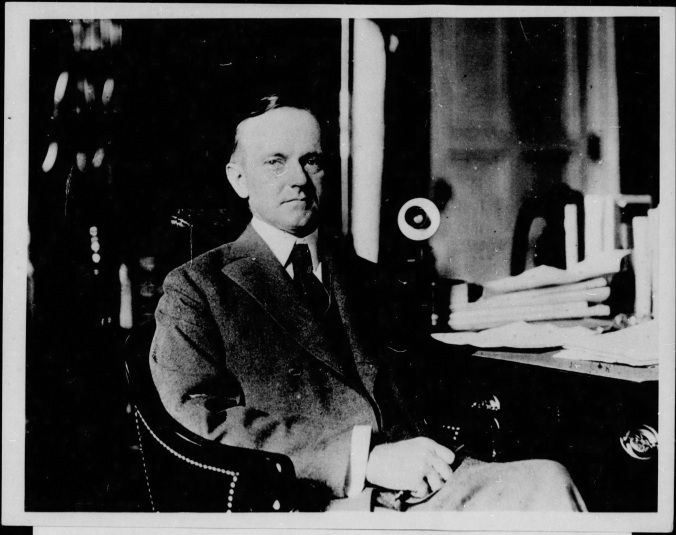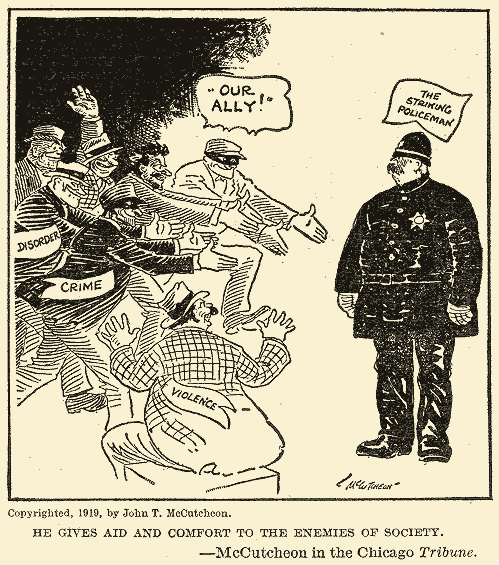“We review the past not in order that we may return to it, but that we find in what direction, straight and clear, it points to the future”— Calvin Coolidge, Burlington, Vermont, June 12, 1923

This month marks the centennial of the Boston Police Strike. It came at the height of a very violent and unsettling year, not only for the city of Boston but for folks across the nation. Armed hostilities may have ended in Europe ten months before but the war and its attendant upheaval continued to wreak havoc everywhere. All had been touched by it in some way. Peace had not and would not automatically follow in the wake of the Armistice.
The country was witnessing a palpable and multi-faceted fear that it might actually be tearing itself apart over political, social, cultural and economic differences. Out of the troubling work conditions experienced by Boston’s police departments came a decision to affiliate with the American Federation of Labor in disregard of department rules. The city would then see the commissioner remove the leaders behind that decision only to have the mayor remove the commissioner. Into that crisis stepped Governor Calvin Coolidge who restored the commissioner to his place and steadfastly declined to reinstate the policemen who walked off their jobs, leaving the city open to lawlessness. When urged by Samuel Gompers, the president of the American Federation of Labor, to reinstate the strikers, Coolidge’s declared, “There is no right to strike against the public safety by any body, any time, any where.”

A recurring take on the strike in contemporary political cartoons.
Governor Coolidge held to a defense of every law enforcement officer’s sacred duty to uphold law impartially, without favor to any person or organization (labor union or not) but to remain exclusively and directly accountable to none other than the people themselves. Though it would likely end his political career, Coolidge stood by his stand anyway. It had the opposite effect, lifting his name into the national sphere. It did not make him anything, it simply revealed qualities that were already his in abundance but became part of an unforeseeable train of events that would elevate Cal to the Vice Presidency and ultimately, the White House. Long before that, however, he would help the displaced strikers found new employment and address many of the issues that troubled the departments leading up to the decision to strike. It is a reminder that our decisions, wise and unwise, often have far-reaching consequences, long beyond our own lives.
Coolidge put the whole issue this way some ten years later, reflecting: “It was beginning to be clear that if voluntary associations were to be permitted to substitute their will for the authority of public officials the end of our government was at hand. The issue was nothing less than whether the law which the people had made through their duly authorized agencies should be supreme.”
Today, Saturday, September 7, 2019, at 4PM (ET), scheduled at the University of Massachusetts Boston, at University Hall in Dorchester, one side of the issues of the Boston Strike (unfortunately, without a full consideration of all sides, including Calvin Coolidge’s response to it), will be heard marking the pivotal developments which unfolded across the city one hundred years ago this month. It would be no less useful and worthwhile to learn what became of those who stayed on duty through the crisis when their brother officers left the stations. It would likewise be interesting to learn more about each of the National Guardsmen who answered the call, mustering to augment the severely depleted police forces and restore order. Calvin Coolidge, performed by the insightful and talented Tracy Messer, has explored what happened and how it was handled from his vantage point. The presentation of the Strike Project will be streamed live for those unable to attend in person. It will be an incredible opportunity and a very interesting occasion.
We encourage you to check it out here!
The serious issues of the strike aside, once it got going, the conflagration was exploited to politically destroy him. It backfired then and continues to boomerang on the perpetrators who attempt to score off of any narrative that ignores the full story. Coolidge would later observe: “No doubt it was the police strike of Boston that brought me into national prominence. That furnished the occasion and I took advantage of the opportunity. I was ready to meet the emergency. Just what lay behind that event I was never able to learn. Sometimes I have mistrusted that it was a design to injure me politically; if so it was only to recoil upon the perpetrators, for it increased my political power many fold” (Autobiography, 139). A word to the wise about politicizing an issue to discredit an opponent, it often backfires in grand style on those who resort to it.
Perhaps the wise and witty Mr. Coolidge belongs at your next event. If so, contact Mr. Messer here.